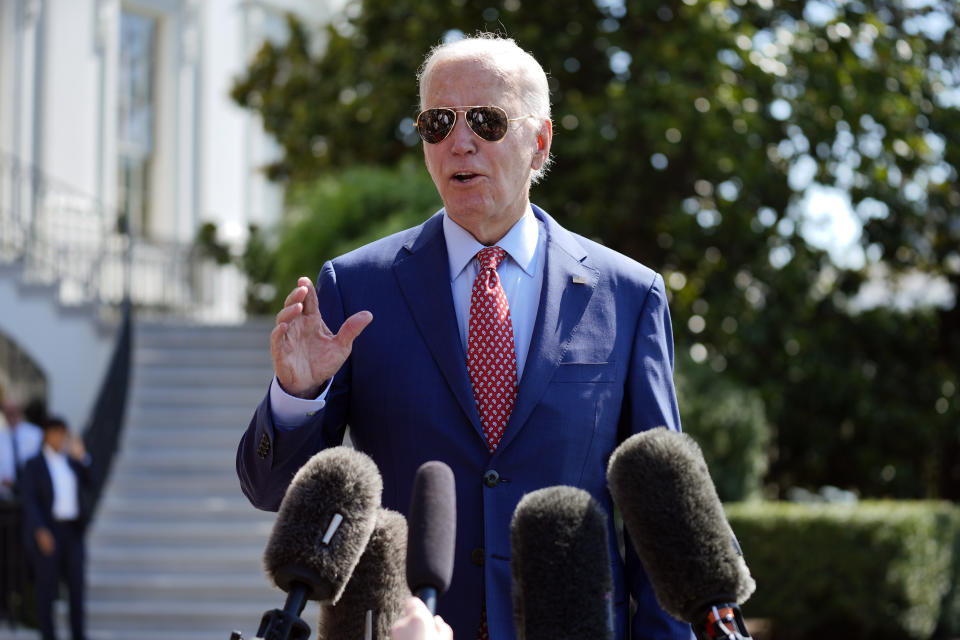After the latest jobs report came in lower than expected, economists took it upon themselves to assure everyone, “Don’t worry, it’s not a recession, at least not yet.” so.”
Excuse me, but isn’t it?
Why do people talk about recession? Job growth under Joe Biden has been at record highs, and that continues. The economy did not cut jobs in July, which is what happens during a recession. It added 114,000 new jobs. That was below the forecast of 175,000, but the job projections have been inaccurate since COVID has crippled the economy since 2020. By the formal definition of recession, we are not close.
Yet talk of a recession is suddenly everywhere because the rising unemployment rate has led to predictions of a recession that have been surprisingly accurate in the past. “Sahm’s Law” measures the acceleration of the unemployment rate, which has risen from a low of 3.4% last year to 4.3% now. Unemployment remains low. But Sahm’s Law says the pace of growth in recent months often means we’re in recession now.
This time (maybe) is different. Even Claudia Sahm, the economist who created the law, thinks so. “Do I think we’re going bankrupt now? No,” Sahm told Yahoo Finance on Aug. 2. “We have a healthy economy; it’s just not pointed in a good way.”
However, the merchants panicked. Stocks fell about 2% on the day of the job news, and the S&P 500 index is down 5.7% from its peak in mid-July. The Nasdaq tech index is down 10% from its July peak and is now in a correction. Since mid-July, the VIX volatility index has jumped from unprecedented levels in the youth to 29, which is the highest mark in almost two years.
What actually happens is a change in story and perspective.
For most of the past year, inflation has slowed as spending and hiring picked up. That suggested the Federal Reserve might stick to “soft landing” by raising interest rates to cool the economy and torpedo inflation without triggering a recession.
Now there are doubts. “A burst labor market raises the risk of staying tight,” Capital Economics announced in an Aug. 2. In addition to the weak jobs numbers for July, the forecasting firm pointed to the rising number of jobless claims and the decline in productivity as signs the economy may be weaker than expected. desired.
That rapid decline changes the outlook for a rate cut by the Fed, which now seems certain to begin in September and could happen more strongly than earlier expectations if there are more signs of weakness. The question now is whether the Fed has waited too long to cut rates and could end up causing a recession after all.


For now, the bottom line seems to be that everything will be stable, there won’t be a recession anytime soon, and the Fed’s rate cuts will finally provide for consumers. charities and other lenders have been waiting. After all, some signs of recession have come and gone with the first alarm turning into comfort.
One example: The yield curve is reversed two years, and that’s usually a strong indicator of a recession – except now. In the fall of 2022, Bloomberg cited a distorted yield curve while predicting a 100% chance of a recession within the year, a prediction that was 100% wrong.
Leave Rick Newman a message, follow him to Xor sign up for his newsletter.
Another example: There have been two consecutive months of negative GDP growth in early 2022, and again, no recession. One more thing: The leading indicators of the economy have also been the deep recession, leading nowhere to bad decisions. If one of these recession signs is correct, it will be a broken clock that tells the correct time twice a day.
The stock market sell-off of the past few weeks has been aggressive but perhaps overdue. Stocks have been in decline since October 2022, and by most metrics they were overbought. A weak wind from stocks will not cause a recession. Meanwhile, the much-maligned Fed is powerless, and still has plenty of power to keep the economy afloat.
The good news may be that “inflation is now a thing of the past,” as economist Robin Brooks of the Brookings Institution wrote on Aug. 2. Biden, in his usual speech after the jobs report, touted the job creation during his presidency, then offered his opinion. home, “Prices are still too high.” Biden and his replacement as the Democratic presidential candidate, Kamala Harris, need to keep saying that, lest they appear to be out of touch with patients who are frustrated by the high price of food and rent.
But inflation won’t be a problem for the next president, assuming he doesn’t do something stupid to wake the monster back from hibernation. The open question for Harris is whether voters will give him a chance on deflation, which is Biden’s biggest economic problem.
Harris is clearly riding high on enthusiasm for his candidacy, which has led to massive fundraising for his campaign and a sharp increase in the Democratic vote. And his opponent Donald Trump is tripping over racial oafish instead of attacking Harris on the economy.
As long as Harris isn’t the one trying to convince voters that there’s no recession, disappointing job numbers and all their ramifications could still be in the party’s favor.
Rick Newman is the main author of Yahoo Finance. Follow him at X on @rickjnewman.
Click here for political news related to business and currency policies that will shape tomorrow’s stock prices.
Read the latest financial and business news from Yahoo Finance
#week #Bidenomics #Repeat #collapse